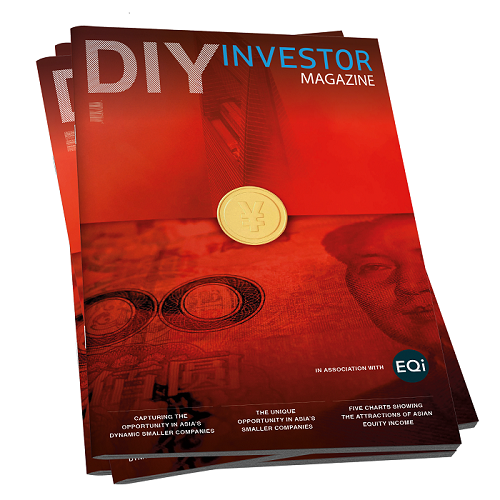Feb
2022
The Unique Opportunity in Asia’s Smaller Companies
DIY Investor
23 February 2022


Nitin Bajaj
Portfolio Manager, Fidelity Asian Values PLC
Portfolio manager Nitin Bajaj reviews the fundamental backdrop facing investors in Asia’s key economies. He discusses how extreme market dislocations are creating buying opportunities among small-cap value companies, particularly in China, and highlights how this translates into the current positioning of Fidelity Asian Values PLC.
One of the major features of the investment landscape across Asia since the start of 2020 has been the material outperformance of small-caps relative to large-caps. This looks like a partial mean reversion from what happened between 2016 and 2019 when large-cap stocks significantly outperformed small-cap stocks.
However, scratch a little deeper and a large discrepancy can be seen within Asia’s smaller companies, where there has been an outsized outperformance of small-cap growth versus small-cap value. Small-cap growth stocks are now trading at a premium of over 100% to small-cap value stocks – a level we last saw in 1999-2000.
Given our small-cap value-oriented focus, this market backdrop has been a big headwind for us. While this can be a headache, it’s not necessarily a bad thing as it means we get to buy some very good businesses without much competition.
In all this, our process has remained unchanged. We continue to believe that fundamental analysis and owning good businesses where the valuation leaves sufficient margin of safety is the most time-tested way to make money in the stock market over the long-term.
Increasing our allocation to China
A wave of regulatory tightening drove significant volatility in Chinese assets over 2021, but we believe the market is now looking cheap in comparison to other markets. As such, we have recently been deploying more capital in China and taking capital out of India, where we think the market is now looking expensive.
But even in markets where valuations are stretched, we are also seeing businesses trading very cheaply, creating opportunities for investors like us.
‘We are excited about the portfolio of businesses we own currently, which are dominant in their industries’
We are excited about the portfolio of businesses we own currently, which are dominant in their industries, earn good returns on capital and are available at attractive valuations. For example, we own a business called Yongda Auto Service, which is the largest dealer for Porsche and BMW in China. Over the last few years, this company has seen rapid growth as the country has become wealthier, with a growing number of consumers aspiring for luxury brands. Quality of earnings has improved as the market matures and its balance sheet is now best-in-class. We believe this stock will continue to do well as China’s wealthy continue to grow.
Outlook
The extreme valuations have been caused by a wall of money – created by governments across the globe in response to the pandemic – all chasing the same stocks in the market. With inflation running at 7% in the US, which is the highest level since the 1980s, and interest rates at zero, essentially the governments are telling everyone, including savers, to go out and borrow.
And this is what they have been doing. For instance, the ratio of margin debt – the amount that investors can borrow to buy stocks – to GDP is at an all-time high. During the tech bubble, it peaked to 3%; at the time of the housing bubble, it spiked to around 3%. It is now at a staggering 4.5%. These levels are not just high in the US – we are seeing this in countries across the globe.
I don’t want to call this a bubble, but it certainly does feel like one. As Warren Buffett succinctly puts it: “A pin lies in wait for every bubble. And when the two eventually meet, a new wave of investors learn some very old lessons.”
Staying vigilant
In conclusion, a few key messages are worth highlighting: firstly, we are in a very experimental world with experimental economic and monetary policies. There is no playbook for this and we do not know how this will end. So, we have to stay vigilant and we have to be nimble.
‘We have to stay vigilant and we have to be nimble’
Secondly, the use of leverage in the market is at extreme levels. This has historically always ended badly. The only way this leverage makes sense is if one believes this time it’s different. And those are very dangerous words. Having said that, the stock market continues to be two-paced and very bifurcated, where on the one hand, we have extreme valuations driven by speculative behaviour, while on the other hand, there are stocks which are completely ignored.
This is creating opportunities in markets such as those in Asia which are in a better shape than the West, but not risk- free. Against this backdrop, I feel confident about the businesses we own, but I will continue to remain watchful in this ever-changing market environment.
Important information
The value of investments and the income from them can go down as well as up, so you may get back less than you invest. Investors should note that the views expressed may no longer be current and may have already been acted upon. Reference to specific securities should not be construed as a recommendation to buy or sell these securities and is included for the purposes of illustration only. Overseas investments are subject to currency fluctuations. This trust can use financial derivative instruments for investment purposes, which may expose it to a higher degree of risk and can cause investments to experience larger than average price fluctuations. This trust invests more heavily than others in smaller companies, which can carry a higher risk because their share prices may be more volatile than those of larger companies and the securities are often less liquid. This trust invests in emerging markets which can be more volatile than other more developed markets. The shares in the investment trust are listed on the London Stock Exchange and their price is affected by supply and demand. This trust can gain additional exposure to the market, known as gearing, potentially increasing volatility. This information is not a personal recommendation for any particular investment. If you are unsure about the suitability of an investment you should speak to an authorised financial adviser
To find out more visit fidelity.co.uk/asianvalues or speak to your adviser

The latest annual reports, key information document (KID) and factsheets can be obtained from our website at www.fidelity.co.uk/its or by calling 0800 41 41 10. The full prospectus may also be obtained from Fidelity. The Alternative Investment Fund Manager (AIFM) of Fidelity Investment Trusts is FIL Investment Services (UK) Limited. Issued by Financial Administration Services Limited, authorised and regulated by the Financial Conduct Authority. Fidelity, Fidelity International, the Fidelity International logo and F symbol are trademarks of FIL Limited.

Commentary » Investment trusts Commentary » Investment trusts Latest » Latest » Mutual funds Commentary
Leave a Reply
You must be logged in to post a comment.